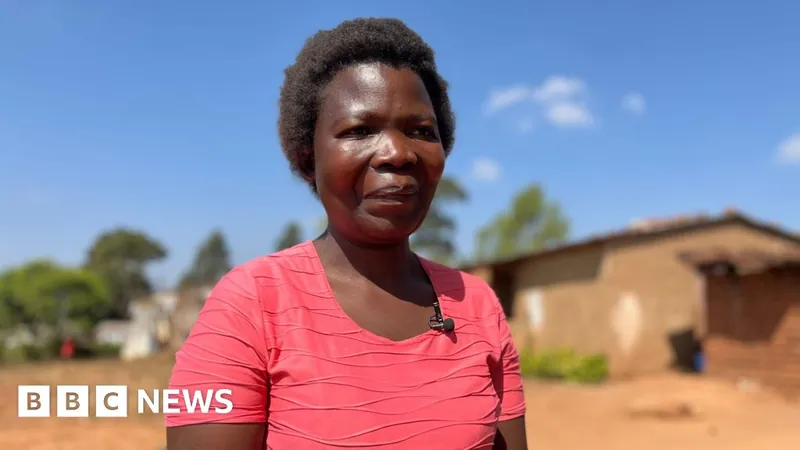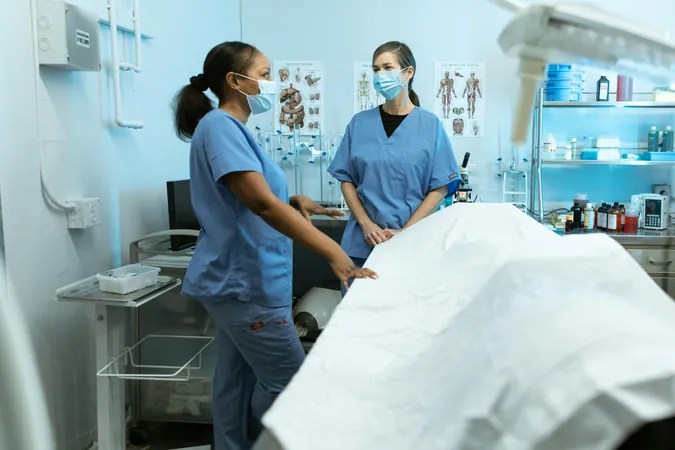
Cervical Cancer Diagnosis During Pregnancy: A Mother's Brave Journey in Malawi
2024-10-08
Author: Yu
Dorothy Masasa, a determined 39-year-old mother of three from Thyolo district in southern Malawi, navigates her daily life joyfully with her baby secured on her back. However, just six months ago, her world was turned upside down when she was diagnosed with cervical cancer while in her first trimester of pregnancy.
Remarkably, Malawi’s healthcare system has recently improved with the introduction of radiotherapy machines, reducing the need for women like Dorothy to travel abroad for urgent cancer treatment. Dorothy's journey began when she was just 13 weeks pregnant. Doctors faced a grim reality when they informed her that her cancer diagnosis during pregnancy posed severe treatment challenges. "They told me these two things don’t go together," Dorothy recounted.
Faced with two difficult choices—an operation that would terminate her pregnancy or chemotherapy that could jeopardize her baby’s health—Dorothy opted for chemotherapy until the safe delivery of her child via Caesarean section, who was born without any disabilities. In a courageous move, she had her uterus removed during the same procedure, marking a significant personal sacrifice in the fight against cancer.
Prior to her diagnosis, Dorothy experienced troubling symptoms: persistent abdominal cramping, unusual bleeding, and a foul-smelling vaginal discharge, which were initially misdiagnosed as a sexually transmitted infection. This highlights a critical issue within Malawi’s healthcare system—many women often receive late diagnoses due to limited access to healthcare facilities and preventive screenings.
Despite her surgery, Dorothy required further treatment to combat the cancer effectively—treatment unavailable in Malawi until earlier this year. With the aid of Médecins Sans Frontières (MSF), she was among 30 women airlifted to a Nairobi hospital for vital radiotherapy, marking a terrifying first plane trip for her and an anxious separation from her newborn.
Upon her return, after facing the physical toll of treatment, including significant weight loss and hair loss, Dorothy expressed her hope for a healthier future. She is one of 77 patients from Malawi who have benefited from airlifts to Kenya since 2022.
Globally, cervical cancer is the fourth most common cancer among women, with substantial fatalities. According to the World Health Organization (WHO), nearly 660,000 new cases and 350,000 deaths were reported in 2022. Alarmingly, the majority of the highest cervical cancer rates are found in African nations due to inadequate access to preventative measures like HPV vaccinations, coupled with limited screening and treatment options. The Queen Elizabeth Central Hospital (QECH), Malawi's largest public health facility, has seen a troubling influx of cervical cancer patients, underscoring the urgent need for improved healthcare services across the region.
Dr. Samuel Meja, an obstetrician and gynecologist at QECH, highlights the dual challenges posed by insufficient screening capabilities and the HIV epidemic affecting sub-Saharan Africa. Notably, Malawi recorded the second-highest cervical cancer rates in southern Africa in 2018, trailing only Eswatini.
In light of stories like Dorothy's, there is a pressing call for investment in women's health services, preventive care access, and support systems for those battling the devastating effects of cervical cancer.





 Brasil (PT)
Brasil (PT)
 Canada (EN)
Canada (EN)
 Chile (ES)
Chile (ES)
 España (ES)
España (ES)
 France (FR)
France (FR)
 Hong Kong (EN)
Hong Kong (EN)
 Italia (IT)
Italia (IT)
 日本 (JA)
日本 (JA)
 Magyarország (HU)
Magyarország (HU)
 Norge (NO)
Norge (NO)
 Polska (PL)
Polska (PL)
 Schweiz (DE)
Schweiz (DE)
 Singapore (EN)
Singapore (EN)
 Sverige (SV)
Sverige (SV)
 Suomi (FI)
Suomi (FI)
 Türkiye (TR)
Türkiye (TR)